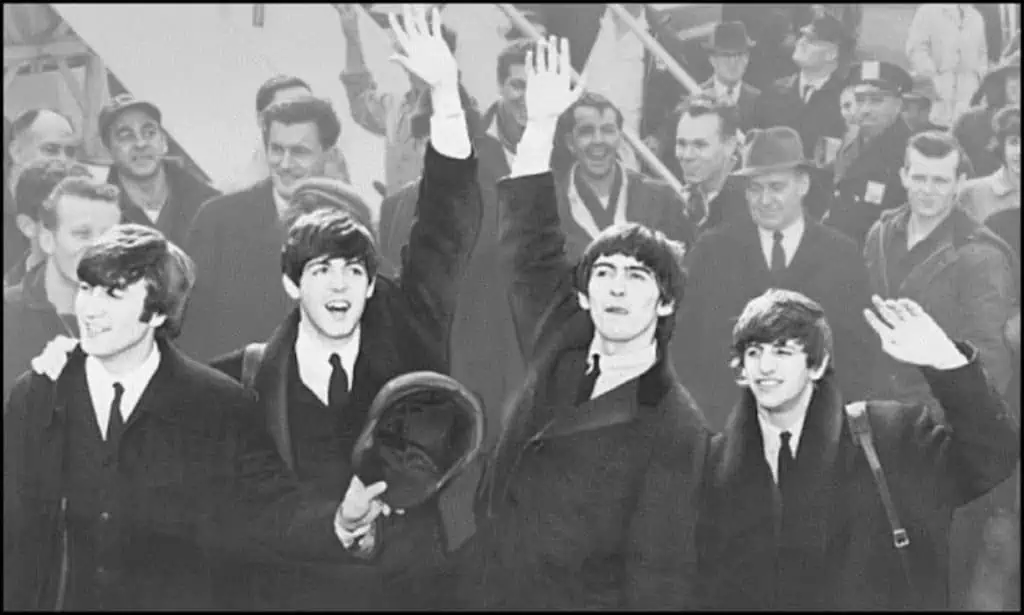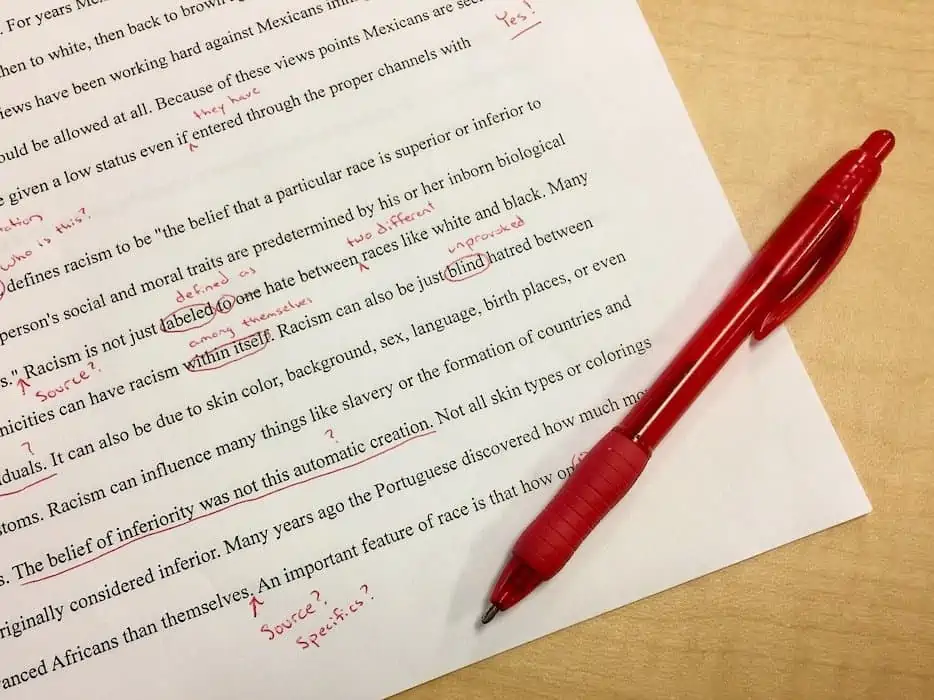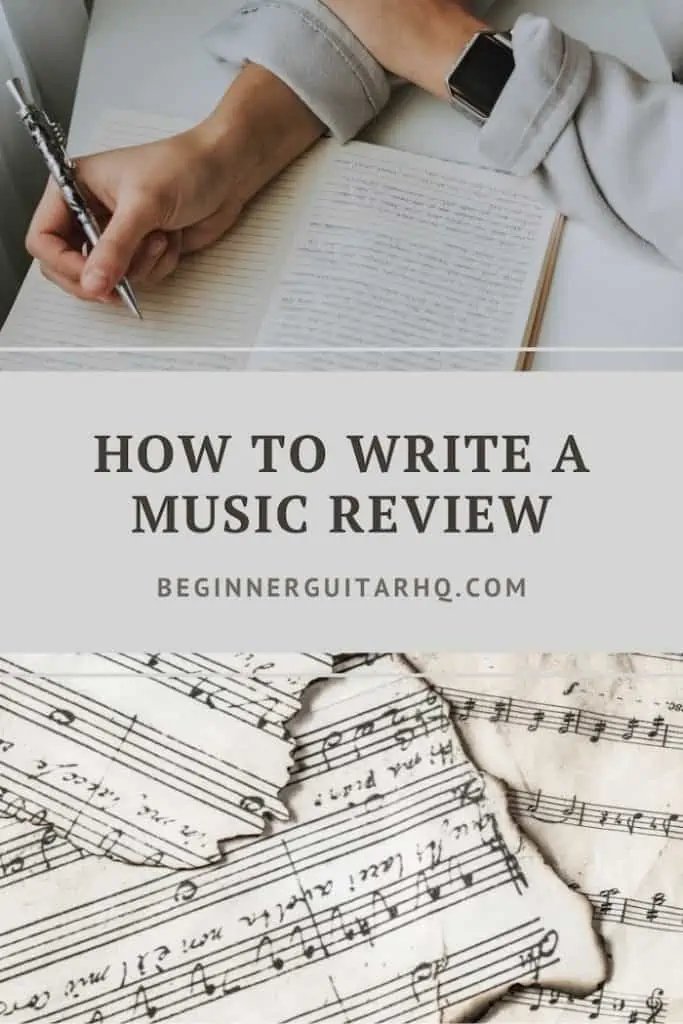Maybe you’re a budding journalist who wants to cover some upcoming indie concerts. Or an influencer who wants to share your favorite old-school reggae album with your followers. Or maybe you’re just a diehard music fan with a lot to say about the latest Spotify releases.
Point is, you want to learn how to write a music review. But where do you start?
Writing a music review may seem daunting. But once you master the basics, you can start bringing your thoughts to life — and have some fun along the way!
Writing a music review isn’t rocket science. However, there are some tried and true guidelines that can help your piece “take off”…
First Things First
Before we open up our laptops or dig out our pens, let’s talk basics…
What is a Music Review?
Simply put, it’s a short article that discusses any piece of music. And I mean ANY. It can be a(n):
- EP
- Music video
- Live performance
- Pre-recorded performance
- Film score
- Classical composition
It’s all fair game!
No matter what format you’re working with, the ultimate goal is to make your music review fun and informative to read.
A good concert review, for example, should make your readers feel like they’re actually there with you in the audience
How Do You Become a Reviewer?
Becoming a music reviewer can be as simple as starting a blog or an Instagram/Facebook/Twitter account. Or maybe even a podcast, TikTok account or YouTube channel, if you want to read your words out loud. Not only can you start sharing your opinions right away. You also get to be your own boss!
<iframe width=”560″ height=”315″ src=”https://www.youtube.com/embed/J3WWycYhLnI” title=”YouTube video player” frameborder=”0″ allow=”accelerometer; autoplay; clipboard-write; encrypted-media; gyroscope; picture-in-picture” allowfullscreen></iframe>
This video has some useful tips about starting your own music blog on Wordpress.
Running your own platform certainly comes with more artistic freedom. However, if you want to reach a wider audience (and get paid!) more quickly, then it’s best to send queries to websites, magazines and/or newspapers that publish music reviews. Even if they’re only looking for a one-off, a well-written piece may eventually lead to a more permanent position. Or at least a good recommendation for future gigs!
Most editors will also want to see a sample of your writing. So, it’s a good idea to have a PDF with a few mock reviews to showcase your skills. Or, for an even more professional touch, you can create an online portfolio on a platform like Squarespace or Wix. Especially if you’re applying through a job site, having a URL handy means editors can make a quicker decision about whether or not to take you on.
How Do You Find Music to Review?
If you write for a website/magazine/newspaper, you’ll probably be pre-assigned music. However, if you’re an independent writer, you might be stuck about what to cover.
One idea is to look at new releases on streaming services like Spotify or Apple Music. This way, you can be (one of) the first to share your thoughts about a particular song or album. Especially if you scout out lesser-known artists flying under the radar of other music critics.
Of course, you don’t have to choose new music exclusively. Lots of readers enjoy fresh takes on music that was released years or even decades ago. 10-year, 20-year or other anniversaries of albums/songs/concert DVDs can be a particularly great time to look back and reconsider how these older tracks hold up from a modern perspective.
Or, you can reach out to up-and-coming bands and independent record companies or music publishers to ask for samples. Even if you only have a modest number of readers/followers, you’d be surprised at how many people are willing to give you sneak peaks of their work.
Tips and Tricks
So, you’ve picked your music and fixed a guideline with your editor (or your inner editor). Now what?
Here comes the fun part –– actually sitting down to write your review.
Every writer has their own routines and preferences. What works for some might not work for others. But however you slice it, some habits will ultimately make the process a lot easier…
Many writers (myself included) find they’re most productive when they have a comfortable workspace. A clean desk with a view. A comfy chair. A hot beverage on hand. Whatever helps you relax and stay focused
Don’t skimp out on research
As the reviewer, you are supposed to be the expert on that particular piece of music. That’s why it’s important to establish your credibility with solid background information about the artist and their work.
Love it or hate it, the researching stage is just as important as the writing/editing stage
First of all, you’ll want to pick good sources about the artist to read/watch/listen to. This can include:
- Interviews on talk shows, podcasts, vlogs, etc.
- Articles in magazines/newspapers
- Bios on their official website
- Verified social media posts on their Instagram, Twitter, Facebook, etc.
Basically anything that will give you context about the artist’s music style, personal history and inspirations behind their work.
It may be tempting to start with Wikipedia. I get it. It exists for a reason. But if you do, don’t forget to fact-check EVERYTHING you find there with more reliable sources!
Some reviewers may consider it “cheating” to read/listen to what others have already said about a piece of music. However, after doing my own research and forming my own opinions, I always find it helpful to branch out and consider other points of view.
For example, other writers may have pointed out important biographical details or production aspects you might have missed in your research. Or, you might have strong opinions about another writer’s judgment on a piece of music. In this case, you can strengthen your own argument by either supporting or opposing this judgment.
However, try not to start beef by directly calling out another writer when you disagree with them. Instead, focus on strengthening your own argument, so readers can see for themselves how it’s the better review. Being civil will earn you more respect in the community and open up more writing opportunities in the future.
Also, if you do decide to read other reviews, don’t plagiarize. Always give proper credit when you borrow words or ideas. You don’t want a potential lawsuit on your hands!
Do listen carefully
Most music writers agree that you should listen to a piece at least 3 times before you start to write. After all, first impressions are important. But later impressions are really where you start to become familiar with and appreciate all the nuances of a piece.
Grab your headphones and keep a notebook (or note-taking app) handy to write down your ideas!
Make sure you’re somewhere free of distractions, so you can really focus on the music. Maybe it’s at a busy coffee shop, where you can let the chatter fade into the background, kick back with your noise-canceling headphones and let the sounds sink in. Maybe it’s when you’re home alone, letting your speakers fill the silence of your bedroom. Or maybe it’s somewhere in between these noise levels. Whatever works for you.
I also find it helpful to take breaks in between listening sessions. This way, you can clear your head and come back in a few hours (or even a few days!) with a fresh perspective.
Do craft a strong outline
When it comes to short stories or novels, I prefer to write freely and see where my creativity takes me.
However, music reviews — like all forms of journalism — need a tight, concise structure. Most people don’t want to read a 5000-word piece that goes off on tangents and takes forever to get to the point! That’s why it’s better to plot an outline before you actually begin to write.
Most music reviews contain this basic structure:
- Introduction: aside from general information about the work (title, artist, date, etc.), this first paragraph should include a hook. This key sentence (or two) is how you pull your readers into the review and make them want to keep reading. Oftentimes, it’s an interesting fact, quote or observation.
- Main body: 2-4 paragraphs that go into detail about the work.
- Conclusion: the final paragraph. This is where you’ll summarize your thoughts about the work. You should also discuss whether or not you’d recommend it –– and if so, to what kinds of people!
Personally, I like to start off by jotting down my ideas in point form. Then, I organize these points into a logical order and expand them into proper sentences
The standard length for music reviews is 250-300 words. If you’re an independent writer, you could write more if you want to. But again, it’s better to keep your piece as short and sweet as possible.
Do try to cover all aspects
250-300 words may not sound like enough to write about an entire album or concert. And really, there is no such thing as a “definitive” review that covers absolutely everything. However, as long as you keep your writing short and to-the-point, you can still squeeze a surprising amount of information into a few short paragraphs.
Some topics may speak to you more than others. Some may not even be relevant at all. But generally speaking, here are some ideas you probably want to think about:
-
- Inspiration behind the music (ex: the artist’s personal history, major influences, etc.)
- Specific songs/lyrics/stage banter
- Themes (ex: love, loss, sociopolitical commentary)
- Composition (ex: chord progressions, melodies, rhythms)
- Instrumentation (ex: types/brands of instruments, sound quality of the instruments)
- Production (ex: key producers/engineers, arrangement, mixing, special effects, lighting)
- Visuals (ex: album cover, choreography, stage design, graphics, band merch)
- Atmosphere (ex: concert venue, audience, camera work)
- The bigger picture (ex: public reception, sales, awards, chart positions, how a track fits in with the rest of the album/EP/score, how an album/EP/score fits in with the artist’s discography)
If you write about classical compositions, you might also want to mention specific notation on the sheet music, like time signatures, dynamics, ornaments, etc.
I’d recommend starting with 2 or 3 of these aspects that really stood out to you during the listening stage. Then, if you have room, you can always discuss other ideas.
Don’t overuse comparisons
Does the film score you’re reviewing remind you of one from a popular historical drama? Or does one of the songs on the album sound like it could’ve been performed by a well-known 80s thrash metal band? If it does, it’s okay to say so. Comparisons help put things in context for readers who are familiar with specific genres and artists.
Still, it’s better to cap the comparisons at 1 or 2 per review. You don’t want to limit yourself from expressing your own metaphors and descriptions!
Another downside to comparisons is that artists often change their sound throughout their careers. For example, a band that sounds “like the Beatles” could mean anything from the standard rock ‘n roll style of “Twist and Shout” to the experimental, psychedelic style of “A Day In the Life” to the orchestral soft rock of “The Long And Winding Road”
Instead of bogging down your review with comparisons to Bob Dylan or Nirvana or Like A Virgin-era Madonna, it’s better to write about how the piece fits into its genre and the artist’s history as a whole. For example, does a folk band’s song have a classic example of their signature bare-bones, acoustic guitar riffs? Or does it experiment with new audio effects or unusual instruments you don’t normally hear in their repertoire?
If you write about what exactly makes a work sound the way it does, it will be a lot more engaging than an endless parade of references.
Do be fair
Sometimes when you write about music you didn’t enjoy, it’s tempting to be overly critical. After all, you want to be honest!
However, instead of “likes” and “dislikes” (which are highly subjective), it’s more helpful to think of strengths and weaknesses. For example, a song with cliché lyrics might still have an elaborate bassline. And a song with catchy lyrics and a memorable riff can still be tainted by a visually boring music video.
All pieces of music have pros and cons. The best reviews consider both, before passing their judgment
That being said, reviews are also about finding a delicate balance between objective facts and personal opinions. If you really loved a piece of music, you can let that passion shine through in your words. And if you didn’t… well, a bit of sass never hurt anyone. Just try not to get too carried away by making your entire review an overdose of sarcasm.
In short, considering both sides of the spectrum will make your argument a lot more persuasive than giving all praise or all criticism.
Do know your audience
Who is your target audience? It might be tempting to say “everyone”. But like clothes, reviews are never really one size fits all.
That’s why it’s important to think about exactly the type of people who read (or who you hope will read!) what you write. Once you know, you’ll not only have an idea about what to discuss in your review. You’ll also know how to use the best tone of voice to engage your readers.
For example, if you write for other music professionals, you’ll want to use proper musicological terms and be as objective as possible. Otherwise, you might sound too amateurish. On the other hand, if you write for Gen Z music fans, it’s better to skip the jargon and use a more personal, informal tone. Otherwise, you might sound too stuck-up.
Reading other reviews that address your target audience can also help you craft the right tone to engage with new readers
Of course, this doesn’t mean you can’t inject your own unique voice into your writing. Just make sure you tweak it to whatever professional or informal tone suits the situation.
Don’t be boring
When it comes to creating memorable reviews, the best ones:
- Avoid clichés (like the plague)
- Limit generic adjectives like “cool”, “interesting” or “unique”
- Use direct and punchy language
Avoiding clichés, generic adjectives and other vague words/phrases will spice up your writing and make it more enjoyable to read
How do you make your writing more punchy? One way is to rework tired clichés into quirky new similes. For example, instead of saying a vocalist sounds “like an angel”, you could say they sound “like a baby robin taking flight for the first time”. Or “a foodie’s inner thoughts when they dig into a gourmet burger”. The possibilities are endless!
Compound adjectives (adjectives with two or more words put together) can be a helpful substitute for generic adjectives. For example, instead of saying a song has a “cool” drum beat, you could say the beat is “chest-thumping” or “beach party-worthy”.
For an extra touch, you can also relive your high school English days and playing around with literary devices, like:
- Alliteration: repeating consonant sounds. Ex: “toe-tapping”, “shoe-shuffling”.
- Oxymoron: putting two opposites together. Ex: “well-managed chaos”, “deafening whispers”.
- Personification: giving human qualities to non-humans. Ex: “groaning guitar riffs”, “a lovestruck camera”.
Don’t forget to edit
Okay, so you’ve finished your first draft. Now comes the real challenge – the editing stage.
Of course, the most basic part of editing is checking your spelling and grammar. Even for informal reviews, a glaring typo or run-on sentence will make your piece look amateurish.
Before you send your work for publication, always use a trusted online spelling/grammar checker. It’s also helpful to get a friend with good writing skills to read over your work and pick up on the errors that Microsoft Word or Grammarly might have missed
However, the editing stage isn’t just about moving commas and removing letters. It’s also an opportunity to…
- Fix what you missed. Ex: Do you still have too many “cool”s and “interesting”s? Is your discussion of the crowd negative? Did you forget to talk about how the backup vocals contrast the lead vocals?
- Brainstorm better ideas. Ex: Could your title be catchier? Could your argument about the piano solo be stronger? Could your last sentence be more powerful?
Another key part of the editing stage is formatting your music review so it’s clean and easy to read. Especially if it’s being published online, using headings, subheadings and bullet points will make it more user-friendly on laptops, tablets and mobile devices.
Of course, there’s no such thing as a perfect review. So don’t get too discouraged if you’re struggling to find how to come up with a better last sentence or break up one long paragraph. Sometimes, it’s just better to fix what you can and accept your piece as it is. Then, you can approach your next review with fresher eyes –– and fresher ideas on how to improve your writing!
Don’t let writer’s block get you down
Writing is hard. I get it. Sometimes you’re just not in the mood and need a quick break.
Spending a few minutes on social media every so often probably won’t set you back too much. However, if you find yourself staring blankly at your screen for 20 minutes or mindlessly scrolling through TikTok for an hour, then it’s time to take action
Ironically, research shows that many writers are actually more productive when they take multiple breaks. For example, in the Pomodoro technique, you work non-stop for 25 minutes, then take a 5-10 minute break before diving back in. You never know. Taking this time to clear your head may help you finally write that perfect last sentence you’ve been struggling with!
Some other effective ways to fight writer’s block include:
- Warming up with a 10-minute writing prompt. Ex: Write a mock customer review of a random household object, like an office chair or a tub of hand cream.
- Trying a different workspace for a change of scenery. Ex: Move to a different room in your house or work outside in your backyard.
- Scheduling your optimal work schedule. Ex: If you’re an early bird, try writing from 6 am to 2 pm. If you’re a night owl, try writing from 4 pm to midnight.
Final Thoughts
Like all skills, writing music reviews takes A LOT of practice. However, if you keep these tips and tricks in mind, it’ll make the whole process a lot a lot less stressful. Not to mention a lot more enjoyable for you and your readers.
Good luck!














